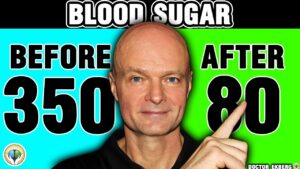In this video, Dr. Lee Knit Kim, a board-certified expert in obesity and internal medicine, highlights common pitfalls that can hinder weight loss success. She emphasizes that there is no one-size-fits-all diet and advises finding a nutrition plan that is sustainable for the long term. Dr. Kim also dispels the misconception that obesity is solely a result of lack of willpower or laziness, explaining that hormonal processes and brain signals play a significant role. She mentions the availability of medications that can help regulate these pathways, such as glp-1 agonists and phentermine. Additionally, Dr. Kim urges individuals to address their relationship with food and emotional eating habits for better outcomes.

Our Summaries are written by our own AI Infrastructure, to save you time on your Health Journey!
Key Insights:
- There is no single best diet or nutrition plan that works for everyone.
- A healthy weight loss journey requires a long-term commitment.
- Obesity is a complex and multifactorial disease, not a result of lack of willpower or laziness.
- Our bodies have hormonal signals that fight against weight loss.
- Medications like glp-1 agonists and Phentermine can help level the playing field for weight loss.
- Paying attention to our relationship with food and emotional eating is important for success.
- Many processed foods are designed to be addictive and can be difficult to stop eating.
- Fixing the emotional aspect of our relationship with food is necessary for long-term success.
Transcript
If losing weight is one of your New Year resolutions, then you need to avoid these common pitfalls that interfere with our success. Hi, I’m Dr. Lee Knit Kim, board certified in obesity and internal medicine. On this channel, I discuss the most up-to-date and evidence-based information on the topics of weight loss, metabolic health, and longevity. Let’s get into it.
First, we need to recognize that there’s no single best diet or nutrition plan that works for everyone. We’re all different, and what works for some people may not work for you. There’s lots of noise out there regarding the best diets, and I see so many debates on whether you should be keto, low fat, plant-based, or carnivore. But the right nutrition plan for you is something that is not too limiting and something you can see yourself sticking to for years. Healthy weight loss is a lifelong journey, not a sprint.
That brings me to my next point, which is recognizing that achieving a healthy weight goes far beyond what you eat. Obesity is a complex and multifactorial disease. For the longest time, people living with obesity have been stigmatized as lacking willpower or being lazy or gluttonous. Well, that could not be further from the truth. Many factors that regulate our weight, hunger, appetite, and how we respond to our environment are all processed in our hypothalamus and limbic parts of our brains, which are outside of our control. So, just like we can’t tell our bodies to stop breathing, we also can’t tell ourselves to not be hungry or to stop seeking food or to stop having constant food chatter in our mind. If you’ve lost weight before and gained it back, please know that it’s not because you suddenly lost willpower or got lazy, but because there are real processes and hormonal signals in our body that fight and defend against weight loss.
Now, that doesn’t mean that it’s all hopeless. Quite the opposite, actually, as we now have great medications available to treat those hormonal pathways. Medications like glp-1 agonists, such as Ozempic and Victoza, or even older medications like Phentermine, level the playing field and help you focus on the right nutrition and lifestyle changes. Having said that, not everyone with obesity needs to be on medications, but for some people, it is the missing link that’s been holding them back from achieving their health goals.
Lastly, a common pitfall to watch out for is not paying enough attention to our relationship with food and why we eat. Our current food environment is full of hyperpalatable and calorie-dense foods that stimulate our dopamine or pleasure receptors and make it easy to eat for comfort rather than actual hunger. That’s why it’s not easy to stop eating sugar or processed foods, as many of those foods are designed to be addictive. The desire to eat those foods often comes from unprocessed and often unpleasant emotions or stress. Anti-obesity medications can certainly help with those, but for many of us, we still need to fix the emotional aspect of why we eat and learn how to process our emotions without food.
I hope this was helpful. I’ll see you in the next one.





